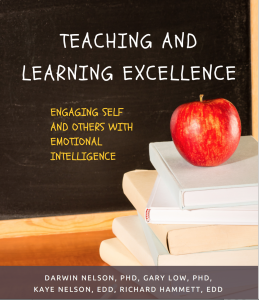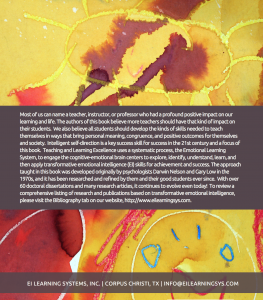Â
Most of us can name a teacher, instrucÂtor, or proÂfesÂsor who had a proÂfound posÂiÂtive impact on our learnÂing and life. The authors of this book believe more teachÂers should have that kind of impact on their stuÂdents. We also believe all stuÂdents should develop the kinds of skills needed to teach themÂselves in ways that bring perÂsonal meanÂing, conÂgruÂence, and posÂiÂtive outÂcomes for themÂselves and sociÂety. IntelÂliÂgent self-direction is a key sucÂcess skill for sucÂcess in the 21st cenÂtury and a focus of this book. TeachÂing and LearnÂing ExcelÂlence uses a sysÂtemÂatic process, the EmoÂtional LearnÂing SysÂtem (ELS), to engage the cognitive-emotional brain cenÂters to explore, idenÂtify, underÂstand, learn, and then apply transÂforÂmaÂtive emoÂtional intelÂliÂgence (EI) skills for achieveÂment and sucÂcess. The approach taught in this book was develÂoped origÂiÂnally by psyÂcholÂoÂgists DarÂwin NelÂson and Gary Low in the 1970s, and it has been researched and refined by them and their good stuÂdents ever since. With over 60 docÂtoral disÂserÂtaÂtions and many research artiÂcles, it conÂtinÂues to evolve even today!  To review a comÂpreÂhenÂsive listÂing of research and pubÂliÂcaÂtions based on transÂforÂmaÂtive emoÂtional intelÂliÂgence, please visit the BibÂliÂogÂraÂphy tab on this webÂsite. http://www.eilearningsys.com.Â
Table of Contents
ForeÂword Excerpt
… as a forÂmer teacher and teacher eduÂcaÂtor of speÂcial needs stuÂdents, I was always lookÂing for an eduÂcaÂtional frameÂwork that works, is posÂiÂtive, and proÂduces good results. After reviewÂing this book it is eviÂdent that “TeachÂing and LearnÂing ExcelÂlence” is applicÂaÂble to all segÂments of today’s stuÂdents, includÂing those with chalÂlenges. The Learned AbilÂity Model described in ChapÂter 3 along with ChapÂter 5 on the EI-Centric CurÂricÂula hold excitÂing promise for transÂformÂing indiÂvidÂuÂals of any age and ability.
… as stuÂdents and adults grow and develop, their jourÂney needs a road map by which to travel less they get lost or sadly yet-never arrive to their desÂtiÂnaÂtion. EI sysÂtems for teachÂing and learnÂing can proÂvide both posÂiÂtive, meanÂingÂful direcÂtions in addiÂtion to sucÂcessÂful outÂcomes – a goal to which we all aspire. AmerÂiÂcan and InterÂnaÂtional eduÂcaÂtion today is focused on high eduÂcaÂtional attainÂment, rapid results, susÂtained accountÂabilÂity, and both short and long-term sucÂcess, which is why this book is so timely. “TeachÂing and LearnÂing ExcelÂlence” and the approaches it describes proÂvides an imporÂtant guide or map we can use to help many stuÂdents and adults stuck in the wilderÂness or underÂachievÂing into today’s schools and society.
I am of the belief that this is their best work yet. Over the years I have been a parÂticÂiÂpant in their research, attended sevÂeral of their annual conÂferÂences, and even preÂsented a paper at one of the conÂferÂences, so I have been very close to their proÂfesÂsional serÂvices. I also believe that the proÂceÂdures and conÂcepts involved in this curÂrent book holds enorÂmous potenÂtial for improvÂing lives and achievÂing sucÂcess⎯ one indiÂvidÂual at a time.
FredÂdie W. LitÂton, Dean
School of EduÂcaÂtion and Human DevelÂopÂment
UniÂverÂsity of Houston-Victoria
PrefÂace Excerpts
Human beings have two unique abilÂiÂties or capacÂiÂties that disÂtinÂguish them from all other life forms: (a) the abilÂity to think reflecÂtively and (b) the awareÂness that we are imperÂfect. TeachÂing and learnÂing excelÂlence involves develÂopÂing and applyÂing conÂstrucÂtive thinkÂing (emoÂtional intelÂliÂgence) skills and perÂfectÂing ourÂselves by achievÂing a meanÂingÂful perÂsonal goal each day. The goal of teachÂing and learnÂing excelÂlence is to become your best self and to do your best (achieve excelÂlence) in what you do and how you are in relaÂtionÂships with others.Â
We offer this book as a a perÂsonal change process that involves your beliefs, thoughts, emoÂtions, and behavÂiors. Your brain and your behavÂior are comÂplex, and posÂiÂtive change occurs one step at a time. We all have the potenÂtial within us to develop excelÂlence and well being. TeachÂing and learnÂing excelÂlence is the process of changÂing and improvÂing yourÂself in ways that are valuÂable and meanÂingÂful to you.Â
Our hope is that you will expeÂriÂence this book as an engagÂing conÂverÂsaÂtion that is helpÂful to you as a perÂson and as a teacher. We have made our best attempt to keep the conÂverÂsaÂtion direct, brief and clear. We accept responÂsiÂbilÂity for our beliefs, thoughts, emoÂtions and behavÂiors and respect your right to difÂfer.  We ask only that you experÂiÂment with the process of teachÂing and learnÂing excelÂlence, and deterÂmine its value and benÂeÂfit for you as you work with others.Â
Part I: TeachÂing ExcelÂlence And Person-Centered Learning
ChapÂter 1: ExplorÂing ExcelÂlence in TeachÂing And Learning
PhiÂlosÂoÂphy
TheÂory
PracÂtice
CreÂatÂing Healthy LearnÂing EnviÂronÂments
PosÂiÂtive ConÂtriÂbuÂtions of Your EmoÂtional Mind
TeachÂing ExcelÂlence AssessÂment
LINK
ChapÂter 2: IdenÂtiÂfyÂing The CharÂacÂterÂisÂtics And Skills of TeachÂing Excellence
TeachÂing And LearnÂing ExcelÂlence With TransÂforÂmaÂtive EI
EI HallÂmarks of TeachÂing and LearnÂing ExcelÂlence
TeachÂing ExcelÂlence ⎯ EmergÂing Research IndiÂcaÂtors
Research and TeachÂing EffecÂtiveÂness
A ConÂtinÂuum of TeachÂing ExcelÂlence
TransÂforÂmaÂtive EI-Centric TeachÂing and LearnÂing ModÂels
LINK
Part II: EduÂcaÂtion And LearnÂing Through The Lens of 
EmoÂtional Intelligence
ChapÂter 3: The Learned AbilÂity Model of EmoÂtional Intelligence
IntroÂducÂtion
Our EI LearnÂing Model: A Focus On PosÂiÂtive Change
TransÂforÂmaÂtive EI TheÂory and EduÂcaÂtion
Beliefs About LearnÂers And LearnÂing
Key ConÂcepts and Unique EleÂments of TransÂforÂmaÂtive EI
EmoÂtional LearnÂing SysÂtem ⎯ ELS
PosÂiÂtive PerÂsonal Change
Applied Research to Improve PracÂtice
LifeÂlong LearnÂing Model
Key LearnÂing Processes of TransÂforÂmaÂtive EI
LearnÂing Ideas to InteÂgrate and Build Upon
TeachÂing and LearnÂing AssumpÂtions
ProbÂlemÂatic BehavÂiors and IndiÂcaÂtors to IdenÂtify and CorÂrect
LearnÂing Goals and OutÂcomes to ConÂsider for Any Course
EI Teaching/Learning MethÂods, StrateÂgies, TechÂniques
Why EmoÂtional IntelÂliÂgence is so ImporÂtant
AccountÂabilÂity: A New Model Is Needed
TeachÂing and LearnÂing ExcelÂlence: A PerÂsonal View
Person-centered and RelaÂtionÂship Focused TeachÂing
LINK
ChapÂter 4: FounÂdaÂtions And CorÂnerÂstones of TransÂforÂmaÂtive
 EmoÂtional Intelligence
IntroÂducÂtion
FounÂdaÂtions ⎯ LearnÂing Model of EmoÂtional IntelÂliÂgence
EmoÂtional IntelÂliÂgence
CorÂnerÂstones of an Education⎯Learning Model of EI
ModÂelÂing EmoÂtional IntelÂliÂgence
ThinkÂing PatÂterns of EmoÂtionÂally IntelÂliÂgent TeachÂers
ConÂnectÂing Key EmoÂtional Skills to Self ActuÂalÂizaÂtion
TeachÂing HopeÂful ThinkÂing
TeachÂing OptiÂmistic ThinkÂing
TeachÂing SucÂcessÂful IntelÂliÂgence
EmoÂtional IntelÂliÂgence and TransÂforÂmaÂtive LearnÂing
LINK
ChapÂter 5: TransÂforÂmaÂtive EI CurÂricÂula for the 21st Century
IntroÂducÂtion
BuildÂing a CulÂture For Learner SucÂcess
InterÂperÂsonal LearnÂing DimenÂsion
LeadÂerÂship LearnÂing DimenÂsion
Self ManÂageÂment LearnÂing DimenÂsion
IntrapÂerÂsonal LearnÂing DimenÂsion
EI-Centric CurÂricÂula: The ESAP LearnÂing SysÂtem
LearnÂing And Career ReadiÂness
ColÂlege SucÂcess, AdaptÂabilÂity LearnÂing, AchieveÂment, RetenÂtion
TeachÂing and LearnÂing EffecÂtiveÂness
LeadÂerÂship and Self DevelÂopÂment: LearnÂing to Lead
PerÂsonal ResponÂsiÂbilÂity and CharÂacÂter DevelÂopÂment
The PerÂsonal ExcelÂlence LearnÂing SysÂtem
LeadÂerÂship and PerÂsonal DevelÂopÂment
PerÂsonal DevelÂopÂment to OrgaÂniÂzaÂtional DevelÂopÂment
PerÂsonal and OrgaÂniÂzaÂtional ExcelÂlence — ConÂcludÂing SumÂmary
Tenets of TransÂforÂmaÂtive EI LeadÂerÂship — LearnÂing to Lead
LINK
Part III: DevelÂopÂing EmoÂtionÂally IntelÂliÂgent TeachÂers
 And Learners
ChapÂter 6: LearnÂing And DevelÂopÂing EmoÂtional IntelÂliÂgence ⎯
The ESAP Model
FounÂdaÂtions For The ELS LearnÂing Model
A PracÂtiÂcal ExamÂple
A FrameÂwork for LearnÂing TransÂforÂmaÂtive EmoÂtional IntelÂliÂgence
13 EI Skills — Lessons — DisÂcusÂsions — StrateÂgies — Key BehavÂiors
EI Skill Set 1 — AsserÂtion
EI Skill Set 2 — Social AwareÂness and ComÂfort
EI Skill Set 3 — EmpaÂthy
EI Skill Set 4 — ConÂstrucÂtive DeciÂsion MakÂing
EI Skill Set 5 — PosÂiÂtive InfluÂence and PerÂsonal LeadÂerÂship
EI Skill Set 6 — Drive Strength and AchieveÂment Drive
EI Skill Set 7 — Time ManÂageÂment
EI Skill Set 8 — ComÂmitÂment Ethic and PerÂsonal ResponÂsiÂbilÂity
EI Skill Set 9 — Self Esteem
EI Skill Set 10 — Stress ManÂageÂment
EI Skill Set 11 — Anger ConÂtrol and ManÂageÂment
EI Skill Set 12 — AnxÂiÂety ManÂageÂment
EI Skill Set 13 — PosÂiÂtive PerÂsonal Change
SumÂmary
LINK
ChapÂter 7: DevelÂopÂing PerÂsonal And TeachÂing ExcelÂlence With
 The PEM LearnÂing System
A FrameÂwork for LearnÂing and DevelÂopÂing PerÂsonal ExcelÂlence
PerÂsonal ExcelÂlence — SysÂtems, PrinÂciÂples, Skills
PEM LearnÂing ModÂule 1: Belief SysÂtem and PrinÂciÂple of PurÂpose
PEM LearnÂing ModÂule 2: GuidÂance SysÂtem and PrinÂciÂple of Vision
PEM LearnÂing ModÂule 3: Power SysÂtem and PrinÂciÂple of ComÂmitÂment
PEM LearnÂing ModÂule 4: SupÂport SysÂtem and PrinÂciÂple of RelaÂtionÂships
PEM LearnÂing ModÂule 5: BalÂance SysÂtem and PrinÂciÂple of Change
A Quick SumÂmary of LearnÂing PerÂsonal ExcelÂlence
LINK
ChapÂter 8: DevelÂopÂing Healthy, ConÂstrucÂtive RelaÂtionÂships With 
Self And Others
ComÂmuÂniÂcaÂtion CliÂmate
IntrapÂerÂsonal ComÂmuÂniÂcaÂtion
IntrapÂerÂsonal ComÂmuÂniÂcaÂtion Model: The EI ChalÂlenged PerÂspecÂtive
SceÂnario 1: NegÂaÂtivÂity to NegÂaÂtivÂity, DestrucÂtion to DestrucÂtion
IntrapÂerÂsonal ComÂmuÂniÂcaÂtion Model: The EI-Centered PerÂspecÂtive
SceÂnario 2: NegÂaÂtivÂity to PosÂiÂtivÂity, DestrucÂtion to ConÂstrucÂtion
LINK
Part IV: ApplyÂing and ModÂelÂing TransÂforÂmaÂtive 
EmoÂtional Intelligence
ChapÂter 9: Goal AchieveÂment, Resiliency, Renewal⎯

The AWAKE Process
The AWAKE Method — Goal AchieveÂment Daily Process
AWAKE — Process, StrucÂture, GuidÂing QuesÂtions, Key Points
AWAKE EI Daily MornÂing Guide – The Process
AWAKE MornÂing Guide ExerÂcise – DarÂwin Nelson’s PerÂsonal ExamÂple
AWAKE EI Daily Night Guide – The Process
AWAKE EI Daily Night Guide – DarÂwin Nelson’s PerÂsonal ExamÂple
AWAKE EI JourÂnal — Log of Daily Goal AchieveÂment
LINK
ChapÂter 10: AchievÂing TeachÂing And LearnÂing Excellence
IntroÂducÂtion
PathÂways to TeachÂing and LearnÂing ExcelÂlence
TransÂforÂmaÂtive EI as a Path to PerÂsonal ExcelÂlence
EmoÂtional IntelÂliÂgence TrainÂing and Research InstiÂtute (EITRI)
India Forum for EI LearnÂing
A ConÂcludÂing Note
RefÂerÂences
AppenÂdix A: TeachÂing ExcelÂlence Assessment
Â
PricÂing: $55.00. Â Please conÂtact us for more information.

